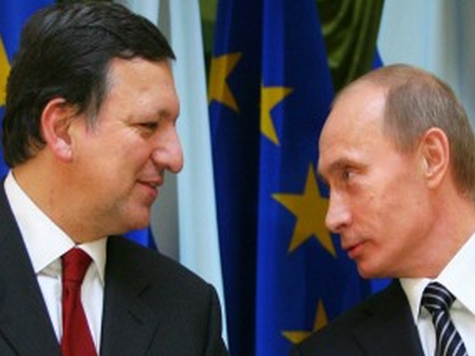In what could be a dangerous example of the European Union elite refusing to learn from their mistakes in Ukraine, José Manuel Barroso, president of the European Commission, has said he will sign an agreement with Moldova in June which will put the former Soviet republic on the path to EU membership.
It was just such an “association agreement” with the EU that set off President Vladimir Putin’s fury over Western interference in Ukraine last year. Despite attempts by the EU to present the agreement as a trade pact, it in fact committed Ukraine to convergence with the EU in foreign and military policy.
When Putin leant on President Viktor Yanukovych not to sign, uprisings were stirred by pro-EU factions in the western half of Ukraine.
This latest move by Brussels on a former Soviet state came the same day Helmut Schmidt, Chancellor of West Germany from 1974 to 1982, criticised the EU for interfering too much in global politics: “even though most [EU] Commissioners almost don’t understand anything about that…The most recent example is the European Commission’s attempt to integrate the Ukraine.”
The 95-year old former Chancellor told Reuters: “This is megalomania, we have no business there.”
Moldova, one of Europe’s poorest countries, is a landlocked state of 3.5 million people whose location makes it strategically sensitive. It is squeezed between Ukraine on its north, east and south, and the EU member state Romania on its west.
The 984-page agreement Barroso wants to sign with Moldova next month will, among other things, oblige the country to cooperation on security and defence policy. Moldova will be obliged to participate in EU-led “military crisis management” operations as well as “relevant exercises and training.”
This could be a particularly inflammatory demand by Brussels, because 20 years ago a strip of territory called Transnistria on Moldova’s border with Russia broke away and declared independence. In an echo of the uprising among the anti-EU Russian-speaking people in the east of Ukraine, the people of Transnistria want to go back to their Soviet roots.
Last week the pro-EU Moldovan authorities seized thousands of petitions from the citizens of Transnistria seeking “reunification with Russia” from a Russian delegation’s plane.
At the same time a plane carrying Russia’s deputy prime minister Dmitry Rogozin, who oversees Russia’s arms industry, was barred from Romania airspace when he tried to fly into Transnistria. Rogozin then tweeted that he would return in a TU-160 strategic bomber if Romania blocks his flights to Transnistria again.
Despite these tensions in Moldova and its surrounding regions, Barroso went ahead with a meeting in Brussels on Thursday with Moldovan prime minister Iurie Leanca in order to “seal Moldova’s path to the EU.”
Rather than try to soothe Russia’s worries over the relentless attempts of the EU to gain power over Russia’s former satellite states, the European Commission president insulted Russia at the press conference after his meeting with Leanca, saying Russia’s efforts to stop Moldova and Ukraine from signing EU trade agreements are a threat to the “civilised” world.
Leanca said that closer EU ties will help him to reunify his country: “A stronger European Moldova will … mean we are much more attractive to…the Transnistria region.”
But hope for regaining control of break-away Transnistria is not all Leanca gained yesterday at the commission.
This year alone Leanca’s government has been the beneficiary of €131m in EU funds. At the meeting, Barroso and Moldovan prime minister signed an agreement that will deliver another €35m for a “vocational and educational system.”
Earlier this month the European Commission also agreed to a further €30m for Moldova “for preparation” for its new relationship with the EU under the Association Agreement.
Brussels has also agreed Moldovan citizens will not need a visa to travel to EU countries. There will also be an energy interconnector to tie Moldova into the EU energy supply.
Having put hundreds of millions of euros in front of the poorest country in Europe in order to “encourage” it to turn its back on historic ties to Russia and surrender its future to the EU, Barroso announced that “Moldova is a free and sovereign country, able to make its own choices… I can say that the Association Agreement will not constitute the end goal in the EU-Moldova relations.”
Which is just the sort of “megalomania” that will threaten Putin.

COMMENTS
Please let us know if you're having issues with commenting.